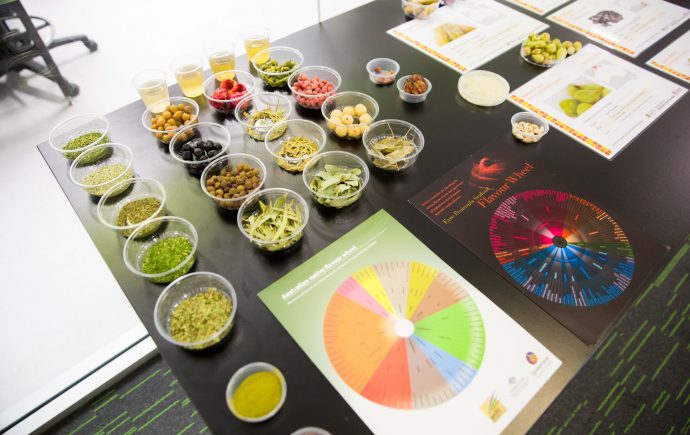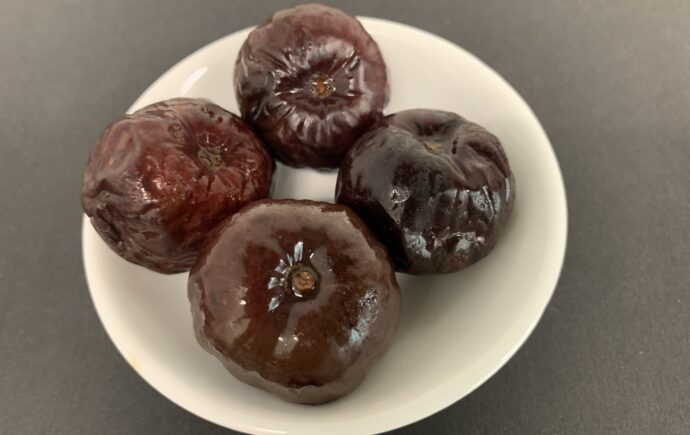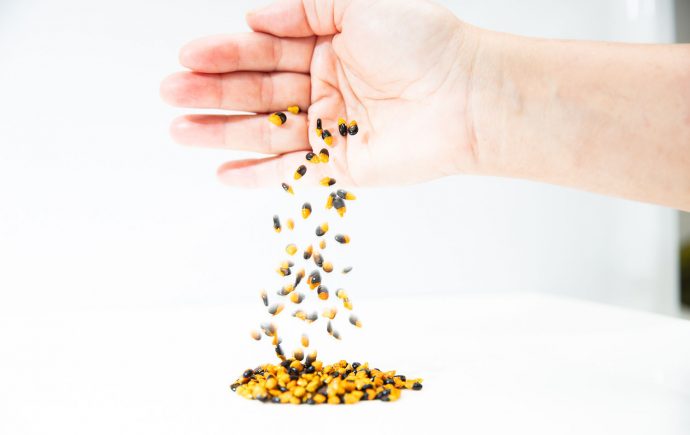Dr Kamalesh Adhikari
Dr Kamalesh Adhikari is Research Fellow with the ARC Industrial Transformation Training Centre for Uniquely Australian Foods and Associate Research Fellow with the ARC Centre of Excellence for Plant Success in Nature and Agriculture at the TC Beirne School of Law, The University of Queensland. His current research focusses on socio-legal issues and concerns associated with the collection, use, and circulation of native and indigenous plants, including traditional knowledge. At the ARC Centre, he coordinates the development of relationships and agreements between several partners, involving plant scientists, Industry, and Indigenous Enterprises. He is also a research partner in the Research Council of Norway and the Fridtjof Nansen Institute’s Suitable Seeds Project which explores the role that intellectual property has played in shaping the history and practices of gene and seed banks. Dr Adhikari is also undertaking a critical account of the concept of farmers’ rights in intellectual property law. Dr Adhikari previously worked as an AIBE Research Fellow at the Australian Institute of Business and Economics (AIBE) and as Research Director at South Asia Watch on Trade, Economics and Environment. He has undertaken collaborative research with a number of institutions including Consumers International and the Southeast Asian Council for Food Security and Fair Trade (Malaysia), United Nations Food and Agriculture Organisation (Italy and Nepal), Fridtjof Nansen Institute and the Development Fund (Norway), International Development Research Centre and International Institute for Sustainable Development (Canada), Sustainable Development Policy Institute (Pakistan), Consumer Unity and Trust Society and Green Foundation (India), Oxfam Novib and Wageningen University (The Netherlands), United Nations Development Programme (Nepal and Sri Lanka), and Institute of Policy Studies and Law and Society Trust (Sri Lanka).
Projects Dr Kamalesh Adhikari is involved with:
Market Insights
Read moreUnderstanding value for Uniquely Australian Foods in target markets Market and marketing opportunities, including the development of trade marks, for the native food sector and specific products will be studied across all relevant products as..
Establishing a value proposition for the burdekin plum
- Prof Yasmina Sultanbawa
- Gengning Chen
- A/Prof Daniel Cozzolino
- Gayathri Rajagopal
- Dr Sandra Olarte Mantilla
- Dr Michael Netzel
- Dr Kamalesh Adhikari
Read moreOverview Native fruits green plum and burdekin plum will be assessed for their chemical composition, nutritional quality and sensory properties. The project will target the functional food industry by developing market specific products with a..
Publications contributed to by Dr Kamalesh Adhikari:
Intellectual property, traditional knowledge, and native biodiversity: convention and progression in the Trans-Pacific Partnership.
- Dr Kamalesh Adhikari
- David J. Jefferson
Download (3.39 MB)The Comprehensive and Progressive Agreement for Trans-Pacific Partnership (Trans-Pacific Partnership or Partnership) is a major multilateral trade agreement between Australia, Brunei, Canada, Chile, Japan, Malaysia, Mexico, New Zealand, Peru, Singapore, and Vietnam that entered into force in December 2018. The Partnership, like many other bilateral, regional, and trans-regional trade treaties that have been enacted since the mid-1990s, is polemical, due in large part to its perceived effects on small scale agriculture, native biodiversity, and local and Indigenous peoples. Civil society criticisms have centred especially on how the Trans-Pacific Partnership’s provisions on intellectual property might encourage the privatisation of plants, seeds, and other genetic resources at the expense of customary practices. The present article analyses these provisions, while also discussing the treatment of traditional knowledge in the Partnership, which is relatively progressive in comparison to prior free trade agreements. The article concludes by deriving lessons that civil society activists, local and Indigenous communities, and domestic authorities could derive from the Trans-Pacific Partnership, towards the end of identifying policy space for the protection of traditional knowledge and native biodiversity.
We Save Landraces – We Use Landraces
- Dr Kamalesh Adhikari
- Azevedo, Vania, Bebeli, Penelope J., Chatzigeorgiou, Alexandra, Gálvez, Amanda, Guarino, Luigi, Kotey, Daniel Ashie, Paczka, Rafael Ortega, Ranieri, Roberto, Spyrou, Sofia, Thanopoulos, Ricos and Valamoti, Soultana Maria
Download (2.55 MB)Being concerned about the continuous neglect of landraces by modern and industrial agricultural, seed and intellectual property laws and policies, during the Sixth Scientific Meeting of Landraces and Indigenous Varieties the Thessaloniki Declaration was adopted. As a global call to conserve and sustainably use landraces and to protect the interests of custodian farmers, peasants, indigenous communities and people all over the world, this Declaration represents the views, concerns and voices of the participants of the meeting and various like-minded individuals and institutions, including peasants’ organizations, farmers’ associations, indigenous peoples’ organizations, scientists, academics, developmental practitioners, and governmental and non-governmental organizations from regions all over the world.
What Should Farmers’ Rights Look Like? The Possible Substance of a Right
- Dr Kamalesh Adhikari
- Bikundo, E, Chacko, X, Chapman, S, Humphries, F, Johnson, H, Keast, E, Lawson, C, Malbon, J, Robinson, D, Rourke, M, Sanderson, J, Tranter, K .
Visit websiteFarmers’ Rights formally appeared in the International Treaty on Plant Genetic Resources for Food and Agriculture (ITPGRFA) as a means of recognising the past, present, and future contributions of farmers in conserving, improving, and making available the plant genetic materials that are important for food and agriculture.
What should farmers’ rights look like? The possible substance of a right
- Dr Kamalesh Adhikari
- Bikundo, E, Chacko, X, Chapman, S, Humphries, F, Johnson, H, Keast, E, Lawson, C, Malbon, J, Robinson, D, Rourke, M, Sanderson, J, Tranter, K.
Visit websiteFarmers’ Rights formally appeared in the International Treaty on Plant Genetic Resources for Food and Agriculture (ITPGRFA) as a means of recognising the past, present, and future contributions of farmers in conserving, improving, and making available the plant genetic materials that are important for food and agriculture.
Plant Variety and Seed Certification
Visit websiteKamalesh Adhikari and David J Jefferson ‘Plant Variety and Seed Certification’, Intangilbia Podcast Interview, December 2020
Reimagining the relationship between food sovereignty and intellectual property for plants: Lessons from Ecuador and Nepal
- Dr Kamalesh Adhikari
- David J. Jefferson
Visit website(2019) Reimaging the relationship between food sovereignty and intellectual property for plants: Lessons from Ecuador and Nepal. The Journal of World Intellectual Property 22(5-6) 396-418.
What does it mean to protect farmers’ varieties as intellectual property?.
Visit website(2020) What does it mean to protect farmers’ varieties as intellectual property?. In Kamalesh Adhikari and David J. Jefferson. Intellectual property law and plant protection: challenges and developments in Asia. (pp. 177-205) Abingdon, United Kingdom: Routledge. doi: 10.4324/9780429059520-10
Policy, politics, and implications of Pakistan’s Plant Breeders’ Rights Act.
- Dr Kamalesh Adhikari
- Muhammad Ahsan Rana,
Visit website(2020). Policy, politics, and implications of Pakistan’s Plant Breeders’ Rights Act. In Kamalesh Adhikari and David J. Jefferson (Ed), Intellectual property law and plant protection: challenges and developments in Asia. (pp. 104-123) Abingdon, United Kingdom: Routledge. doi: 10.4324/9780429059520-6
Intellectual property law for plant varieties: challenges and developments in Asia.
- Dr Kamalesh Adhikari
- David J Jefferson
Visit website(2020). Intellectual property law for plant varieties: challenges and developments in Asia. In Kamalesh Adhikari and David J Jefferson (Ed), Intellectual property law and plant protection: challenges and developments in Asia. (pp. 1-11) Abingdon, United Kingdom: Routledge. doi: 10.4324/9780429059520-1
From neglect to protection: recognising the importance of farmers’ varieties in Sri Lanka.
- Dr Kamalesh Adhikari
- Asanka Perera
Visit website(2020) From neglect to protection: recognising the importance of farmers’ varieties in Sri Lanka. In Kamalesh Adhikari and David J. Jefferson (Ed), Intellectual property law and plant protection: challenges and developments in Asia. (pp. 161-176) Abingdon, United Kingdom: Routledge. doi: 10.4324/9780429059520-9



